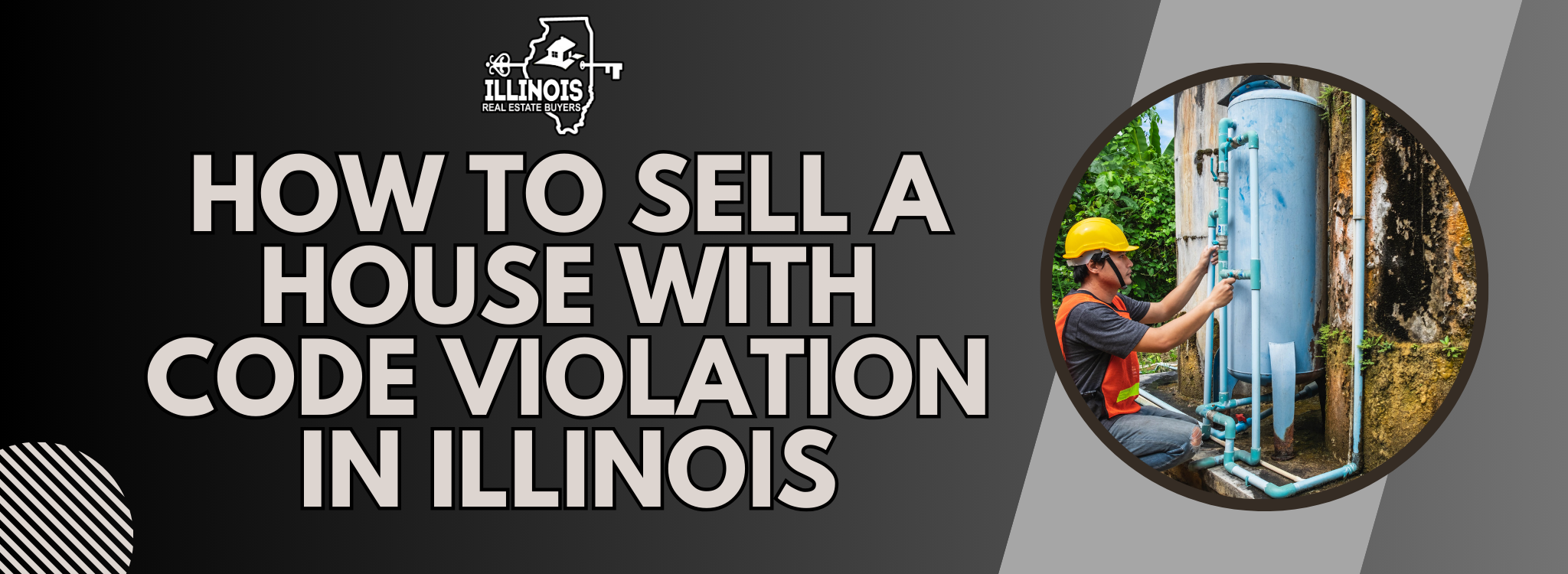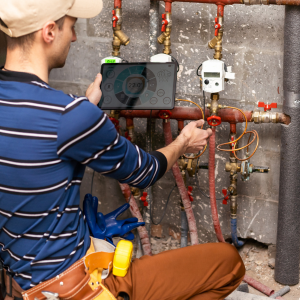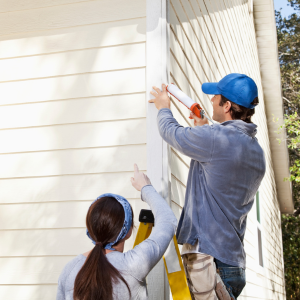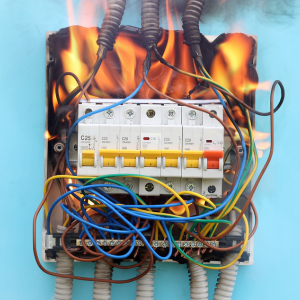
Understanding Code Violations in Illinois
Understanding code violations is important for anyone involved in real estate, whether you’re selling your home or working as an expert. Knowing how these violations impact properties in Illinois can be crucial.
What are the implications of having code violations?

Code violations can greatly affect a property’s value and attractiveness. If a property doesn’t comply with local building codes, it might lead to fines and other issues that sellers need to consider. These are some common effects:
• Financial Penalties: If you have unresolved code violations, you could face fines that keep adding up, which can become a big financial problem.
• Decreased Property Value: Homes with unresolved violations usually drop in market value because buyers may include repair costs in their offers.
• Delayed Sales Process: Selling a home with code violations can slow the process because buyers might want them fixed before closing the deal.
Knowing these issues helps you plan better, making the selling process smoother.
How do local codes differ across Illinois?
Illinois is a large state with different building codes in each area. Regional laws set local codes, and they specify what properties in that region must do to comply. Here’s what you need to know:
• Jurisdictional Differences: Each city or county might have its building codes. For instance, Chicago’s codes can be different from those in Springfield.
• Building Code Compliance: The rules may differ not just by location but also by the property type and its use.
• Local Ordinances Impact: Changes in local laws can alter compliance standards, so staying updated is necessary.
Talking to an expert who knows these differences can give you better advice for your area and property.
What kinds of properties are most affected by code violations?

All types of properties can face code violations, but some are more likely than others. Identifying high-risk properties can help prevent problems:
• Older Homes: Homes that haven’t been updated according to current building standards are often at higher risk.
• Multi-unit Buildings: Apartments and condos might need more inspections because of their complex designs and shared areas.
• Commercial Properties: These typically follow stricter safety codes due to larger crowds.
By managing these risks early with the help of real estate professionals and inspectors, you can reduce the negative effects of code violations. This approach helps you achieve better outcomes, whether buying or selling in the Illinois market.
Legal Responsibilities and Code Compliance for Sellers
Are sellers legally required to disclose code violations?
When selling a home, it’s critical to understand your legal obligations regarding code infractions. In Illinois, you must comply with real estate disclosure regulations. These guidelines oblige sellers to notify buyers of any known property difficulties, including code violations. Being truthful is essential for avoiding legal troubles later.
The Illinois seller disclosure legislation requires you to complete a Residential Real Property Disclosure Report. This report covers any code violation notice processes applicable to the property. Not disclosing this information can cause major problems throughout the sale.
Some code breaches may necessitate repairs before the transaction can be completed. Solving these issues early on will ensure that purchasers are aware of the property’s condition.
What are the consequences of not addressing code violations?

Ignoring code infractions can have major consequences for sellers. You may risk fines or litigation if you sell a home without addressing code concerns. To avoid these outcomes, it is critical to understand how code enforcement works, as unresolved breaches can result in significant penalties.
Fines for code violations in Illinois help maintain good property standards. However, these fines can soon build up, generating financial hardship and making selling more difficult. In addition, property disclosures in Illinois are critical, and failing to declare infractions can harm your seller’s image.
Sellers should endeavor to rectify code violations ahead of time to ensure a smooth sale and protect themselves from legal issues.
How does code compliance affect the sale process?
Code compliance is critical in the Illinois home-selling process. Obtaining a code compliance certificate helps demonstrate to buyers that the property complies with local regulations, making the sale process easier. Selling a home with difficulties may deter buyers or result in lesser bids.
Code infractions can significantly impact property values. Unresolved concerns may reduce the property’s value, impacting selling negotiations and final prices. By addressing these problems early on, you can make selling easier while preserving or increasing the property’s value.
Working with real estate experts and code compliance professionals enables you to deal with these problems efficiently, resulting in a successful sale.
Financial Impact and Selling Strategies
How can code violations impact property value?

Code violations, including unpermitted renovations, can dramatically reduce a property’s value. Such flaws, like structural faults or failure to comply with local safety regulations, detract from a home’s desirability. In Illinois, housing code infractions often cause buyers to view properties as hazardous or costly, resulting in lower offers. If a home does not meet Illinois construction standards, it may require expensive renovations before it can be sold at fair market value. Understanding these violations and their impact on the real estate market is critical for sellers aiming to maximize their returns.
What financial strategies can sellers consider?
Sellers facing code violations have several options to think about:
• Selling without repairs: Some sell “as-is,” letting buyers handle any necessary fixes. This can attract investors who want to renovate.
• Negotiation: Sellers might adjust the sale price by considering repair costs. This requires being open with buyers about the issues.
• Fixing code violations before selling: Making important repairs before listing the home can lead to a quicker sale and better price. Focus on cost-effective improvements, especially those that ensure safety and compliance.
Each strategy has its pros and cons in the Illinois real estate market. Consulting a local real estate professional can help determine the best approach for your situation.
Should you invest in fixing code violations before selling?

The decision to rectify code violations before selling is based on whether the gain in property value justifies the repair expenditures. Fixing these issues can reduce buyer fears and result in greater bids. Updating to meet rules increases the property’s appeal while ensuring compliance with Illinois building codes and disclosure requirements.
However, the seriousness of the infringement and the cost of repair should be considered. Minor adjustments may be worthwhile, but major upgrades require careful consideration. Getting counsel from a real estate expert or contractor familiar with local codes might help you make this decision.
Addressing code infractions can increase a home’s appeal and reassure purchasers of its safety, positively influencing the sale outcome.
Exploring Alternative Selling Options
Is selling as-is a viable option for properties with violations?
Selling a house with code problems can be difficult, but selling “as-is” may be a viable option. When you sell your property as is, you inform buyers that you will not undertake any repairs. This alternative is popular in the Illinois real estate market, where housing code violations are prevalent and costly to resolve.
By taking this approach, you may attract buyers interested in fixer-uppers or investment houses. It is critical to be open about code infractions; keeping them hidden could lead to legal consequences later. In Illinois, recording such infractions protects both the seller and the buyer. Selling as-is often expedites the process for people who wish to sell quickly without making any improvements.
How do cash buyers handle properties with code issues?

Cash buyers are more likely to purchase properties with code concerns. These buyers, such as real estate investors in Illinois, focus on the property’s potential value rather than its existing condition. They prefer to buy properties quickly and cheaply, so code infractions may not affect their interest.
Cash buyers provide sellers with rapid transactions that avoid the delays associated with traditional financing. The buyer normally takes on the duty of resolving code issues and allowing you to sell without making any more investments. To minimize future problems, each agreement should indicate the buyer’s obligation to rectify these infractions.
Can listing with a real estate professional help manage code violations?
Working with an Illinois real estate professional might help you sell a home that has code issues. Real estate professionals can provide helpful advice on selling homes while coping with these challenges. They walk you through the code violation notification process and assist you in satisfying all seller disclosure obligations.
Experts assist with marketing and negotiating, boosting the likelihood of contacting purchasers willing to purchase houses with code difficulties. An experienced buyer will assist you with property disclosures, ensuring that information about violations of Illinois rules is obvious. This candor fosters trust and helps to avoid legal issues after the sale.
When dealing with code infractions, considering options such as selling as-is, working with cash purchasers, or hiring real estate brokers might provide strategic advantages. Each option offers advantages and disadvantages, assisting you in making an informed decision based on your unique circumstances.
Expert Insights and Practical Tips for Sellers
What expert advice is available for handling code violations?
Dealing with code breaches can be difficult, but with the right assistance, it becomes doable. According to experts, you should see an Illinois real estate attorney. They can advise you on how to approach these challenges legally. This helps you understand the requirements while selling a property that has infractions.
Hiring an expert to inspect your home and offer a code compliance certificate is also advantageous. This certificate verifies that your property complies with local construction codes, providing buyers with peace of mind. An Illinois real estate professional adds, “Fixing code violations early can prevent problems later.”
How can sellers prepare their homes under current market conditions?

In today’s Illinois real estate market, sellers should prepare their houses strategically. Focus on important house upgrades that are in line with purchasers’ current desires. These could be energy-saving enhancements or updates to kitchens and bathrooms.
A thorough inspection might reveal concealed code problems, allowing you to correct them before selling. According to an Illinois real estate professional, “Homes that are ready often sell faster and for more money.” Showing a well-kept property can help with negotiations.
What additional resources are available to assist sellers in Illinois?
Illinois home sellers have a wealth of options at their disposal to assist them in selling their properties. The Illinois Division of Real Estate provides critical information about state home-selling rules. This helps you understand the proper legal actions to take.
It can also be beneficial to seek guidance from experienced Illinois real estate brokers. They know local trends and can help you with selling, listing, and negotiating recommendations.
Speaking with legal specialists can keep you updated if you are concerned about legal difficulties when selling with code breaches. With the correct materials and skilled counsel, sellers may easily enter the Illinois real estate market.
FAQs:
How can I sell my Illinois property with code violations?
You can sell your Illinois property “as is” without fixing the code violations. Based on these violations, consider finding cash buyers who might be open to negotiation. It’s a good idea to talk to a reliable real estate professional or attorney in Illinois for advice specific to your situation.
Are there risks involved in selling a house with code violations in IL?
Yes, risks include possible legal issues and a decrease in property value. However, selling to experienced investors or cash buyers focusing on fixer-uppers can help ease these risks. They usually understand these deals and might offer solutions to speed up the process.
Should I fix code violations before putting my house on the market?
Fixing code violations can make your property more appealing and help prevent delays while selling. Whether you fix them depends on how severe and costly the repairs are. Getting repair estimates can help you decide if fixing is better than selling “as-is.”
What are the buyer’s responsibilities for code violations in Illinois?
In Illinois, buyers need to understand any disclosed code violations. They should do thorough inspections, and it’s wise for them to work with a knowledgeable real estate professional familiar with buying homes with noted violations.
How do code violations affect the marketability of my home in Illinois?
Code violations can make your home less attractive to potential buyers, possibly leading to renegotiations or lower offers. Addressing necessary conditions or offering incentives can improve marketability. An expert real estate professional can help adjust your marketing strategy.
Can selling a house with code violations delay the closing process?
Yes, unresolved violations can cause delays, especially with financing or inspections. To avoid this, you could secure a code compliance certificate or sell to cash buyers who bypass traditional loan requirements.
What disclosures must I make when selling in Illinois?
Illinois law requires sellers to disclose any known property issues, including code violations, to potential buyers. Not disclosing can lead to legal trouble. Consult with a legal expert to ensure you know your obligations under Illinois seller disclosure laws.
Is it possible to sell my house quickly despite code violations?
Yes, especially if you market it to investors or cash buyers looking for properties to renovate. Highlighting the investment potential can attract the right buyers fast. Working with a real estate professional who sells distressed properties can also help speed up the process.
Key Insights
• Selling a house with code violations in Illinois can be challenging. Understanding the Illinois housing code violations and consulting local ordinances can help avoid surprises.
• Learn about selling as-is property while handling code violation notice procedures. Use resources from the Illinois Division of Real Estate for help with property sales and code compliance.
• It’s crucial to know the buyer’s responsibility for code violations. Negotiating prices with code issues often attracts reliable cash buyers, making the sale easier, even in tough situations.
• You might not have to renovate to meet codes or fix code violations before selling. Think about selling without repairs if faced with many Illinois building codes.
• Understand how code violations affect property value and ways to market a problem property. These issues can influence the Illinois real estate market, but experienced investors often seek distressed properties.
• To sell quickly, disclose any known code issues and talk to a real estate attorney in Illinois about legal matters. Consider all offers, regardless of risks from code violations.
• Navigating code enforcement and getting a code compliance certificate can take time. With advice from seasoned real estate professionals, sellers can often manage these tasks more smoothly.
• Fixing improper or expired code compliance is important. Creating an attractive listing for fixer-uppers can attract potential buyers willing to make necessary improvements.
• When deciding on a selling strategy, consider mandatory repairs and the cost of bringing your property up to code. Factors like Illinois property tax implications and home warranty considerations are also key.
Are you looking to sell a house in Illinois? Whether you’re in Chicago, Aurora, Joliet, Naperville, Elgin, or nearby areas, we’re here to help make the process easy and stress-free. Our expertise applies across the state, ensuring you get the guidance you need no matter where your property is located. We also buy houses, offering a fast and convenient solution for homeowners looking to sell quickly.
To learn more about selling your house in Illinois or to explore your options, feel free to Contact Us at (773) 305-6373. We’re ready to assist you every step of the way!


